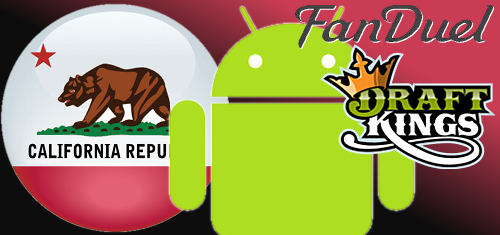 Google has reversed its policy toward allowing real-money daily fantasy sports (DFS) apps in its Google Play store.
Google has reversed its policy toward allowing real-money daily fantasy sports (DFS) apps in its Google Play store.
Google quietly approved Android apps by DFS market leaders DraftKings and FanDuel in its Google Play store over the weekend. DraftKings’ app appeared first, with FanDuel following suit the next day.
In August 2013, Google Play restricted all gambling apps, including ‘games of skill,’ if they offered “prizes of cash or other value.” Both DraftKings and FanDuel had Android apps in Google Play, but their functionality was limited to checking scores and stats. In May, FanDuel released a new Android app promising the “full Fanduel experience” for players, but the app was available only via FanDuel’s website.
Google Play’s developer program policies have not been altered, and a source told Fortune.com that the app approvals were part of a “closed, limited pilot” program in the US Google Play store. Google doesn’t intend to take a transaction fee from the two apps.
Regardless of intent, the move will be viewed by many as an endorsement of the app creators’ view that DFS isn’t gambling – a view that isn’t shared by many in the regulated gambling industry, the folks at Gamblers Anonymous and an increasing number of regulators in some US states.
CALIFORNIA INTRODUCES FANTASY SPORTS BILL
Speaking of, California Assemblyman Adam Gray used the closing hours of the state’s legislative session to amend legislation to regulate the DFS industry. On Thursday, Gray filed an amended version of AB 1437, which used to deal with gaming addiction but is now titled the Internet Fantasy Sports Game Protection Act.
AB 1437 would require DFS operators doing business with California residents to obtain a license from the state. Operators would be required to pay an unspecified license fee that would be credited against quarterly payments based on an unspecified percentage of an operator’s gross revenue.
DFS players would also be taxed on their winnings and they would have to be 21 years of age or older to play (like any other gambling activity). Operators would have to offer players the opportunity to sign up for a self-exclusion program.
DFS oversight would be handled by California’s Department of Justice and operators who break the rules would be subject to fines of no less than $1k for a first offense, rising to $10k for a fifth and subsequent violations.
AB 1437’s introduction will undoubtedly bolster the national conversation regarding the need for DFS regulation. It will also prove interesting for Amaya Gaming, which recently entered the DFS sector via its August acquisition of Victiv (since rebranded as StarsDraft). Amaya’s PokerStars brand is considered one of the prime obstacles to the state passing online poker legislation and it will be interesting to see whether PokerStars’ alleged ‘bad actor’ taint has any impact on Amaya’s ability to obtain a California DFS license.
